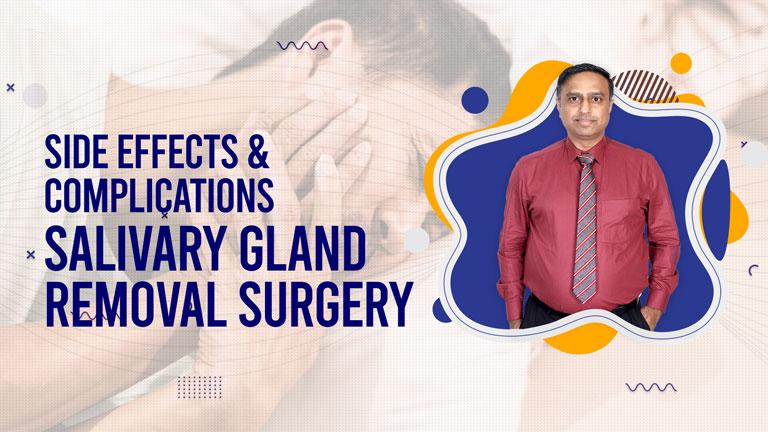Undergoing salivary gland removal surgery, medically known as a salivary gland excision, is a significant step in addressing various salivary gland disorders. While this procedure can bring relief to patients dealing with chronic pain or recurrent infections, it’s essential to be informed about potential side effects and complications that may arise during the post-operative phase. In this blog post, we’ll delve into the common side effects, and potential complications associated with salivary gland removal surgery, and discuss the situations when you might need to consult a doctor, empowering you with the knowledge to navigate your recovery journey more effectively.
What is Salivary Gland Removal Surgery or parotidectomy?
Post-operative salivary gland removal surgery side effects
Pain and Discomfort: Pain around the surgical site is common immediately after the procedure. Your surgeon will prescribe pain medications to manage this discomfort effectively.
Swelling and Bruising: Swelling and bruising around the surgical area are expected and should gradually subside within a few days to weeks.
Limited Mouth Opening: Due to the proximity of the salivary glands to the jaw muscles, you might experience temporary difficulty in fully opening your mouth. Gentle exercises can help improve your jaw’s mobility over time.
Dry Mouth: The removal of salivary glands can lead to reduced saliva production, causing a dry mouth. Staying hydrated and using artificial saliva products can help alleviate this discomfort.
Numbness: Temporary numbness around the surgical area or even in surrounding regions can occur due to nerve irritation during the surgery. Sensation usually returns as the nerves heal.
What are the common complications after salivary gland surgery?
Infection: Infections at the surgical site are possible. Ensure you follow your surgeon’s post-operative care instructions, including proper wound care, to minimize this risk.
Bleeding: While some bleeding immediately after surgery is normal, persistent or heavy bleeding requires immediate medical attention.
Scarring: Surgical incisions can result in scars. Proper wound care and the use of scar-reduction techniques can help minimize their appearance.
Salivary Fistula: In some cases, a small channel can develop between the remaining salivary glands and the skin. This can lead to saliva leakage from the incision site.
Nerve Damage: Though rare, nerve damage can lead to persistent numbness, pain, or altered sensations in the facial area. This usually improves over time but may require medical intervention if it is severe.
Facial Weakness: If facial nerves are affected during surgery, temporary or permanent facial weakness can occur.
NOTE: Remember that every person’s recovery is unique, and it’s always better to err on the side of caution when it comes to your health. If you’re uncertain about any symptoms or changes you’re experiencing during your recovery period, don’t hesitate to contact your surgeon or healthcare provider for advice and appropriate medical care.
When should you consult a doctor during the recovery period?
Consulting a doctor during the recovery period after salivary gland removal surgery is crucial to ensure that any potential complications or issues are addressed promptly. It’s better to seek medical attention if you have;
- Excessive Bleeding
- Signs of Infection
- Worsening Pain
- Difficulty Breathing or
- Swallowing
- Unusual Discharge
- Persistent Numbness or Tingling
- Facial Asymmetry or Weakness
- Difficulty Opening the Mouth
- High Fever
- Unresolved Swelling or Bruising
- Persistent Dry Mouth
- Unrelenting Discomfort






